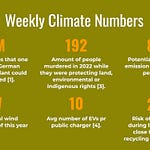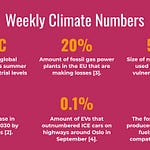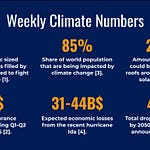Welcome to this weeks edition of The Weekly Climate 🎉
Reference: Drilled News
This week I decided to mix up the climate numbers with a quote. I will do this every now and then whenever there’s something that’s so important it deserves it. This one is crucial to understanding what BP is doing right now. Of course I will dive deeper on this one below.
‼️News you can’t miss
Here’s one important scary/bad (🙀), good (😻), interesting (😼) and fossil (💩) news item.
🙀 Nothing this week is as scary as the evidence mounting against BPs attempting to pull another Beyond Petroleum
😻 A new tool in fighting “zombie fires” have been found.
😼 Bladeless windturbine anyone?
💩 Big fossil has known since the 60s about the health risks posed by their products.
👩⚕️ Status: Climate & Science
Let’s look at how we’re doing this week!
[#wildfire] — Siberia and other parts of the world was ravaged last year by so called “Zombie fires” which is a type fire that has burned underground for the entire winter, but only resurfaced as summer temperature allows it to. A research study looks into various kinds of materials that can be used by fire fighters to more quickly control the zombie fires and that effort has landed on a particular plant-based material that is biodegradable.
[#greenland] — Plant fossils taken from a deep ice core from the Greenland Ice Sheet indicates that Greenland might have been green million of years ago. This hereby sends a warning to the rest of us that Greenland was once ice-free.
[#louisiana] — I just finished Elizabeths Kolberts excellent book “Under a white sky” last week too and then this article dives into one of the stories she dives into. The troubled case of Louisiana. This article recaps the problems Louisiana is facing with sea level rise and the plan to stay above water.
📰 The 7 Grand Challenges
⚡️Decarbonize Electricity
Clean electricity is the one do-or-die challenge we must solve.
[#wind] — A group of researchers have looked at the available land for onshore wind turbines in order to figure out all the places that they could be placed to use onshore wind effectively. The research highlights 3 different paths which depending on local legislation may come true.
[#wind] — I bet those researchers weren’t taking this into account: A startup named Vortex Bladeless has invented a new type of wind turbine that can harness the power of the wind without the classic rotating blades. The benefit? The low area of the wind turbine might allow it to be deployed in a residential setting. The company is looking for an industrial partner to build a 140m high windturbine with the power output of 1MW.
[#energystorage] — Energy storage is ripe with interesting innovations. This article interviews CEO of Zinc8 Energy Solutions, which develops Zinc-air batteries, which compared to lithium-ion batteries are lightweight, more compact and made of less-flammable materials than other batteries.
[#solar] — Operators of a large solar farm in Australia has managed to tune their inverters (a crucial component for converting DC power produced by the solar panels to AC) so much that they can avoid adding extra equipment such as spinning reserves to their grid. This just goes to show how much new technology can still help in this still pretty old industry.
🏘 Reduce impact of urban and rural areas
Lowering the impact of urban and rural areas.
[#decarbonizehome] — Here’s a story about one homeowner’s struggle with decarbonizing his own home. The fossil fuel industry is everywhere..
[#ban] — A new report reveals that the US is the country in the world with the most city-wide bans on fossil fuels. This could be for instance banning new gas hookups and similar. I wonder why this is not more prevalent around the world.
[#construction] — After a number of local governments in the US had been championing greener building codes the organisation overseeing the codes have removed the governments right to vote. This looks like yet another successful campaign by the fossil gas industry to derail attempts at killing it.
🛁 Clean non-electrifiable activities
Some activities we do today can’t be electrified, these must be cleaned some other way.
[#plastic] — Have you microwaved your plastic today? Well you shouldn’t. Really. Don’t do it. But a company named Pyrowave has invented a technique to basically use high-powered microwave ovens to increase the yield of plastic being recycled.
[#blackcarbon] — Here’s a look at what the International Maritime Organisation are doing and what shipping companies can do to limit the the temperature increase in the Arctic. It’s quite simple. Switch to another fuel. Even a different fossil fuel based one is better than this crap that many ships uses today. The problem is the so called black carbon which lands on top of the ice and thus causes it to warm faster.
[#foodwaste] — A new paper looks into so called wet waste to be used for net-zero sustainable aviation fuels. The paper even highlights a method with which to make these fuels that would be carbon negative. How? By using food waste, which is a huge source of carbon emissions.
🌳 Protect and grow nature
Nature is our ally, we must protect it and help it help us.
[#sink] — A new study indicates that the so called CO2 fertilization effect (how much CO2 plants capture) are dropping. The reason, the increased levels of CO2 is not in sync with other key nutrients that the plants need to grow, hence even if the plants enjoy the increased levels of CO2 they can’t use the additional CO2 to grow even further, thus limiting the effect of carbon sinks on the planet.
[#ghostforest] — A new report looks into the rise of ghost forests. A ghost forest is forest which have been inundated by salt water, which causes the trees to die. With increased flooding comes more ghost forsts.
🍽 Optimize food
Without the lower impact of food or drink the hero doesn’t work (modified old danish proverb).
[#agrisolar] — A new paper on so called “agrisolar”, where farm land is interspersed with solar panels, claims that farmers doing that will help solve grid access problems in Australia. I for one am really psyched about agrisolar.
[#cows] — This article takes a sobering look at the idea of using algae in cow feed to limit their methane emissions. While true that algae in cow feed can limit their methane emissions by as much as 80%, the problem is that we need to scale that algae feed to feed 1.5 billion cows on the planet. If you’re interested in reading more about the algae feed, take a look at this Grist article. It’s weird. Normally it would be Wired that posts the techno-optimists stuff and Grist that shoots it down, but this time it’s the other way around.
[#fishing] — Bottom-trawling, which is the practice of dragging big fishing nets across the ocean floor, releases as much carbon dioxide as aviation every year. This new report is the first time the carbon dioxide emissions of this type of fishing is studied and it makes one think about how many other activities we are performing today that have not yet been measured.
[#farmland] — Techcrunch continue their foray into writing about farming. This time about how farmers are using an online platform known as AcreTrader to raise money for agricultural development projects.
⚖️ Climate Justice
Without justice there’s no future.
[#lawsuit] — A new lawsuit against a company handling fracking waste has been opened in Argentina. The company has for years been handling fracking waste illegally to the detriment of the natural ecosystem and the nearby poor inhabitants.
📦 Other / catch-all
All the other stuff that I couldn’t fit into any of the other categories, than the other category.
[#activism] — A really engaging portrait of Jane Fonda’s long career in fighting for our future. The world could sure use many more of her.
[#music] — When I’m not working on climate via this newsletter or Massive.earth and I’m not spending time with my family I love playing guitar and piano. So it’s great to see some debate in the music industry as well about what to do about climate change. In this article Massive Attack’s “3D” bashes the music industry from not doing enough while simultaneously discussing what not do to. He argues that culture is important and bands shouldn’t stop touring (as Coldplay recently declared to do), but instead act in other ways. 3D himself is working on a project with the Tyndall Centre for Climate Change Research that helps map the emissions from the music industry.
⭐️Special Topics
🎩 Global and local policy
We have a special interest in covering the major global and local policies regarding climate, whether good or bad.
[#china] — This article dives deeper into China’ recently announced new 5 year plan and hints that China seems to have a big cognitive dissonance between wanting or at least pledging to do something about climate change and still building a lot of new coal power plants.
[#canada] — The Canadian Conservative party (current opposition) have voted and proclaimed that they are all climate deniers. The party got new leadership and that leadership tried to gather the party around an ambitious climate agenda. That failed apparently spectacularly.
⛽️Major Carbon Emitters
We have a special interest in covering the moving of the major carbon emitters as these are the key roadblock to climate action.
[#bp] — The “highlight” (or rather lowlight) of the week: Drilled’s Amy Westervelt looks at BP’s actions over the past year as well as some internal strategy documents and concludes loud and clear: BP is not going to drive the energy transition no matter what it appears to say. It’s litterally “Beyond Petroleum” all over again. The arguments: The CEO says loud and clear the BP will be in the oil and gas business for decades to come and that he’s proud of that. Furthermore, in the document it’s clear that “energy transition” for BP means fossil gas, which is not really the transition we need.
[#health] — New fossil fuel industry internal documents that The Guardian have seen shows that the fossil fuel industry has been aware of the dire health risks related to air pollution yet have fought rules to limit the right to clean air for 50 years 🤕.
[#greenwashing] — Chevron is being taken to court for greenwashing. NGOs such as Greenpeace, Earthworks and Global Witness filed a complaint with the US judicial system last week. It’s the first time this particular kind of lawsuit has been filed.
[#investing] — A new report determines that investing in renewable energy is far, far better than investing in fossil fuels. The report concludes that over 10 years, returns on fossil fuels have been 60%, where renewable energy has reaped 420% average return. An unfortunate side-point: Although 420% beats 60% clearly, no-one would probably complain from a 60% return.
[#finance] — This article in the Guardian dives deep into Wall Streets transformation from backing polluters to ... doing so less. It recaps all the initiatives of 2020 such as the Science Based Targets Initiative.
[#activistinvesting] — I love activist investors. In a letter last week, Exxon warns that activist investor “Engine no. 1”’s plan will threaten Exxon’s dividend. The Engine no 1 is a hedge fund that owns 0.02% of Exxon’s share and is known for it’s aggressive stance on climate action and has called out Exxon for poor returns and poor environmental stewardship. This is great.
That’s it for this week folks! Remember if you’re feeling down, angry or sad from some of the news in this newsletter one cure is to act. And one way you can always act that also happens to be one of the most powerful things you can do is to talk about it. That also works if what you just read made you hopeful or happy btw.
If you enjoyed this newsletter don’t forget to share it with your friends, coworkers or other people you think could benefit from getting it. If you got directed here by a friend or another link on the Internet don’t forget to subscribe!
See you all next week 👋












